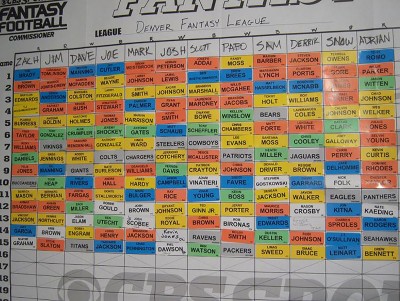
This summer, I worked a part-time job at the New England Patriots Pro Shop. One night in August, I was asked to help restock the back warehouse. My boss told me to go grab two other employees to help me. I was shocked to see the two workers were already in the back where the shipment was, only they weren’t restocking — they were doing a fantasy football mock draft for the 10th time in three hours.
I honestly had no clue why people got so infatuated with fantasy sports. I mean, you spend all that time analyzing stats and teams to make a dream team. I thought that all fantasy sports were an imaginary farce and a waste of time. Besides, I had only ever done fantasy sports on one occasion, when I helped my dad make a team for his work fantasy football league, and I was 13 at the time.
That was the case until this past March.
My friend sent me a message on Facebook asking if I would be interested in making a fantasy Major League Soccer team for his league. I figured since there wasn’t any money on the line, why not? I accepted the offer and made my first solo effort in the world of fantasy sports.
I quickly realized that it was actually much harder than it seemed, but I got the hang of it rather quickly. To make a long story short, I’m currently in first place, constantly checking my roster for injuries and inundating my friends and family with useless facts about players they’ve never heard of before.
By participating in fantasy sports, I have finally stepped into the light and seen the truth behind the American fascination with this institution. What I once viewed as tedious I now see as an amazingly positive activity for all sports fans, including, according to the Fantasy Sports Trade Association, 56.8 million North Americans.
By immersing yourself in something, you can fully understand everything about what that thing is. For instance, when watching ESPN or just about any other sports channel, it’s not uncommon to find pundits belittling and criticizing coaches, even though they’ve never had any real experience coaching themselves.
That, by and large, is why fantasy sports exist. They’re not just for amusement but to help better educate the public about sports. By partaking in, say, fantasy soccer, I’ve learned more about the MLS, its players and its teams than I ever knew was possible.
Not only do fantasy sports provide deeper information about a league, but they also increase viewership and interest. Fans will keep a closer eye on how their team is performing, but they also begin to watch many other teams and players.
In my brief time doing fantasy, my interest in MLS has caused me to watch Spanish-language games on Friday nights at 11:00 p.m. just to make sure the players on my team are doing well. And I know I might be a little crazy for doing that (even my mom thinks so), but it has given me a better understanding of my own team and its place in the league.
It doesn’t stop there. In an article published by CBS Boston, companies said they are willing to accept a fiscal loss in productivity from employees if it results in congeniality in the workplace and increased morale. Fantasy sports not only allow people to become friendly with coworkers, but also, amazingly enough, lead to increased productivity in the long term.
There are, however, downsides to this fun practice. The one thing that has deterred me from fantasy sports over the years is the monetary aspect. What really decreases the value and merit of fantasy sports is placing money into a pot to award the winner at the end of the season. Now, while professional sports do pay out to champions, the money teams receive are from endorsements, not from other teams paying the champs.
Gambling on fantasy sports turns something that is meant to be entertaining and informative into an exclusive corruption of athletics. Websites like FanDuel and DraftKings endorse this practice. Although fantasy sports are, as the title suggests, a fantasy, the integrity of sports should still be upheld.
Professional coaches and athletes who gamble on their sports can be severely punished and even banned altogether. The same moral principles should exist in fantasy sports. My fantasy MLS league is a no-money contest and everyone seems to still be having a good time without the promise of a lottery prize at the end, watching and participating in a sport we all love.
One of the most increasingly popular activities among Americans, fantasy sports allow for full immersion in the wide world of sports. Not just for amusement, fantasy sports increase viewership and knowledge of sports for Americans, along with providing a unique social opportunity and a morale-boosting experience.
Despite tarnishing the integrity of something people view as a fun and leisurely activity, fantasy sports are and will continue to be a staple of the American and even the global sports experience.



















































































































